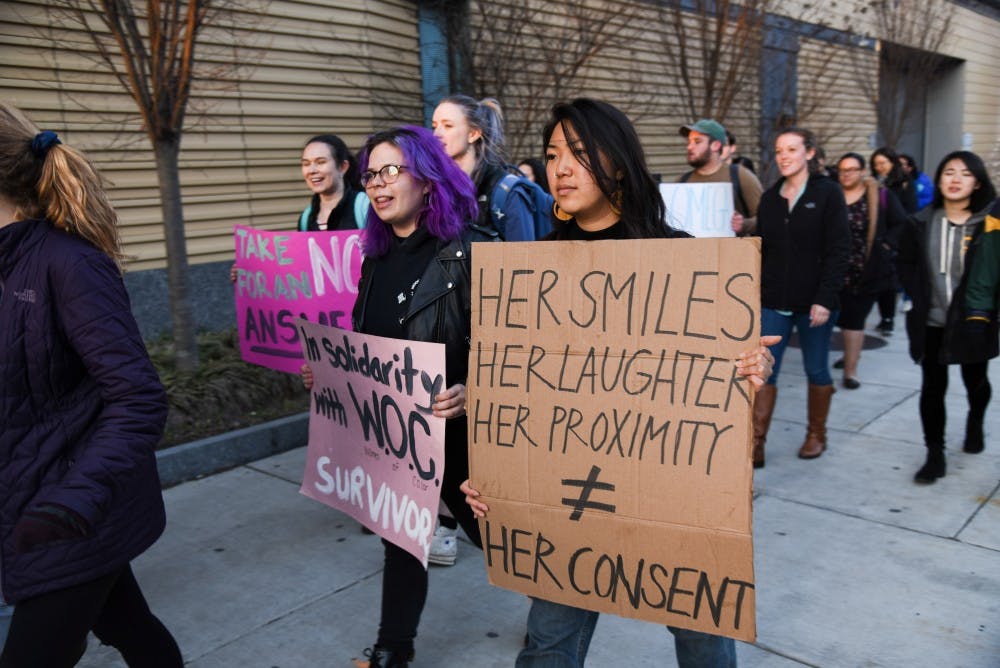U.S. Education Secretary Betsy DeVos is preparing new sexual misconduct policies for college campuses that would expand the rights of the accused, allow for cross-examination during mediation, and reverse other Obama-era regulations that hold universities more responsible for sexual misconduct. Penn is no exception.
Experts and campus anti-assault groups say these proposed rules could affect the way sexual misconduct is handled at universities such as Penn in significant ways, with the potential to make it more difficult for complainants to voice their concerns.
Penn Law professor Claire Finkelstein represents a unique voice on the issue, having helped draft Penn’s current policy on sexual assault and harassment along with General Counsel Wendy White and former Provost Vincent Price.
Finkelstein said there were two major policy changes that would impact Penn as a result of the new guidelines: allowing for cross-examination of accusers and requiring a higher standard of evidence when determining whether a student is responsible of misconduct.
In the past, parties were discouraged from cross-examining each other to avoid creating a "hostile environment" for alleged victims, as per the United States Department of Education Office for Civil Rights in the 2011 Dear Colleague Letter. The letter has since been revoked as of September 2017.

Gage Skidmore | CC BY-SA 2.0
DeVos's directive marks an enormous change and would dissuade victims from coming forward due to fears of having their character tarnished during cross-examination, Finkelstein said.
“If [the Department of Education] does demand that schools allow for cross-examination of the victim, then I do believe that would have a strongly chilling effect, and that victims would be more reluctant to come forward,” Finkelstein said. “Nobody wants to come forward if that’s the treatment they are going to get.”
RELATED:
Two Penn profs sign letter denouncing 'believe the victim' policies for sexual assault
Students critique sexual assault policy after admin. say they haven't heard significant feedback
Finkelstein added that while cross-examination may be appropriate for criminal courts, in a campus setting it is far more problematic and could over-legalize the process without being essential for getting at the truth of the issue.
College senior James Hiebert, president of Men Against Rape and Sexual Assault, echoed some of Finkelstein’s concerns over the reports of the new policies.
“While the updated guidelines and rules have yet to be released, we are distressed with policy changes that would hamper efforts to make campuses places that are safe to live and learn free from sexual and interpersonal violence,” Hiebert said.
The second major change in DeVos's proposed regulations that Finkelstein said could most impact Penn was the shift from deciding cases on “preponderance of evidence” to “clear and convincing evidence."
“'Preponderance of evidence' means that the accused would be found responsible if there was even a 51 percent probability that he did what he was accused of," Finkelstein said. "All of us [involved with drafting Penn’s policy] thought that was too low of a burden of proof."
The Department of Education will now implement what Finkelstein views is the correct standard and raise the burden of proof to “clear and convincing evidence” — phrasing she finds an improvement over Penn's current Obama-era protocol.
Finkelstein said, nevertheless, schools such as Harvard University would be far more affected by the proposed changes than Penn, since it went further in the Obama-era in revising its policies.
“Penn has a pretty balanced policy that retains hearings; some schools went so far as to eliminate hearings," Finkelstein said. "Penn retained hearings, retained the possibility of lawyers representing the accused, and maintained a lot of the due process safeguards that the current administration wants to see in the policy."
Finkelstein added that overall, Penn’s policy will hold up under both standards, proving acceptable under both the Obama Department of Education guidelines and DeVos’s proposal, with the exception of the issues of burden of proof and cross-examination.
DeVos is expected to formally roll out the new proposals in the coming days, but reports indicate the regulations will not come into effect anytime soon.
The Atlantic reported it could take months or up to a year before the regulations are finalized. During that time, the Department of Education is legally required to take public comment into account. Once the comment period is over, however, these new rules will not require an act of Congress and will carry the full force of the law.
College junior Tanya Jain, programming chair of Penn Association of Gender Equality, said the new rules don't support survivors and are an example of the silencing of vulnerable populations in order to maintain rape culture on campus.
"We know that only about 2 percent of all rape and sex charges are determined to be false, so these new rules are protecting nothing but rape culture," Jain said. "Penn is a dangerous place for women and these rules are making it even more so. It's frustrating and disappointing that survivors are not made the priority during the creation of these rules."
Overall, Finkelstein said she views the proposed rules as a worrying shift in the spirit behind sexual misconduct policies.
“What I’m more concerned about with the new regulations is not necessarily the specifics, but the spirit and intent behind the regulations, which is to make it more difficult for complainants to come forward,” Finkelstein said. “Though I know the [Trump] administration talks about giving support to victims for coming forward, everyone knows which way the pendulum is swinging.”









